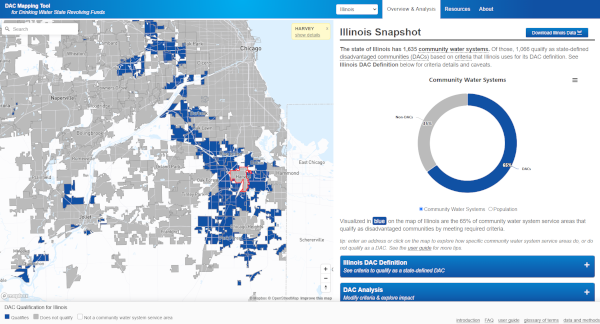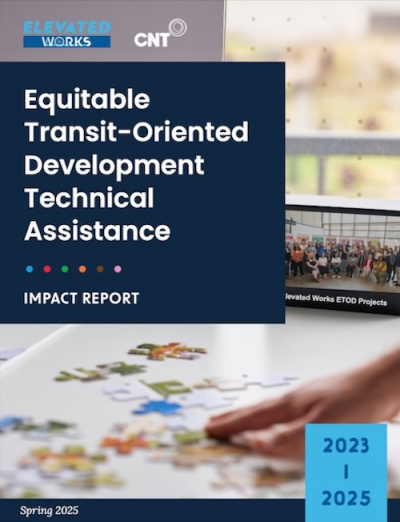
Who am I and why do I live in a food desert? (Hint - It’s because I’m Black)
A food desert is commonly defined as a neighborhood area more than a mile away from full-service food access. First, a little context: I am a Black female millennial who rents on the West Side of Chicago. Grocery shopping is the only form of shopping I enjoy, I engage in it every other day. My parents moved me to an auto-oriented suburb when I was very young. Without anyone telling me it was so, I believed that when I saw a person walking they did so because they were destitute... Read the rest of this entry »
CNT Welcomes Its New Director of Transportation Equity Heidy Persaud
While it’s an interesting time to start a new job, I am enthusiastic about my upcoming role as Director of Transportation Equity at the Center for Neighborhood Technology (CNT). I get to join a talented and innovative team, while working to tackle our work on transportation with a multidisciplinary and equitable focus. I will be jumping right into some important and fascinating projects. With our partners at TransitCenter, I’ll be working with transit agencies and advocates across the... Read the rest of this entry »
Envisioning a More Equitable and Sustainable Future
Life has turned upside down for families and communities around the world over the past several months. Inequality, poverty, and lack of access to basic needs, which we have long struggled with in our communities, has been made exponentially worse by this global pandemic and its economic fallout. CNT’s staff (working from home) is continuing to help cities solve today’s problems while creating visions for the future of sustainable, equitable communities. It is our hope that when this is all... Read the rest of this entry »
What Do People Want to See in Chicago’s Next eTOD Plan?
Transit-oriented development (TOD) anchors vibrant communities around transit stops. When homes, offices, retail, and other amenities are located nearby, people can spend less time and money getting to all the places in their daily lives. Equitable transit-oriented development (eTOD) takes this a step further by making sure that the benefits of living and working near transit are available to people of all races and income levels. For the past three years, CNT has been working with Elevated... Read the rest of this entry »
Recovery and Resilience
During disasters, we focus on crisis management: treating the sick and providing the basic services we need to survive. Right now, we need support for the frontline public health workers and emergency service providers who are dealing with this crisis firsthand, and economic assistance for the retail and hospitality and service workers who have lost their jobs. We applaud the foundations and individuals who are giving generously to these necessary causes. I am not the first person to note... Read the rest of this entry »
Advocacy Perspective on the History of Equity in Transportation
At this year's Transportation Research Board's (TRB) meeting, twelve TRB committees came together to sponsor a session entitled, "Equity Reframed: Looking Back and Planning Ahead." The focus was to review historical milestones and forecast future opportunities to eliminate systemic barriers to full equity by marginalized communities and to provide more equitable access to transportation services. As a speaker, I had the opportunity to share CNT’s perspective. Our session ... Read the rest of this entry »
What We Learned from Chicago’s E-scooter Pilot Program
Today, the City of Chicago released an evaluation of the city’s e-scooter pilot. The program, which ran from June 15th to October 15th 2019 within a designated area on the west and northwest sides, involved 10 e-scooter providers, over 800,000 reported rides, and was intended to evaluate whether e-scooters could enhance the sustainability, equity, and safety of the city’s transportation system. CNT applauds the City of Chicago’s commitment to rigorous analysis and community engagement to... Read the rest of this entry »
TNC's Residential Parking Impacts and Housing Affordability
Transportation experts often talk about the potential of Transportation Network Companies (TNCs) to solve the “last mile problem.” What they usually mean is the potential for people to use TNCs in combination with transit to reach key destinations just outside the reach of transit. Many of the collaboration pilots around the country between TNCs, transit agencies, and employers are aimed at addressing the last mile problem of work trips, particularly to suburban locations that lack safe... Read the rest of this entry »
Tech Challenge Participants Address the Question: "Is there a high cost to being poor?"
On December 10, 2019, CNT’s tech challenge participants presented their final project results. Students from UIC and IIT partnered with three community groups – Austin Coming Together (ACT), Community Organizing and Family Issues (COFI), and Dr. Pedro Albizu Campos High School – to answer one guiding question: Is there a high cost to being poor? To answer this question community groups picked a topic most pressing to their community members. Are absentee landlords a problem in Austin... Read the rest of this entry »
Is Ridehailing Equitably Available Across Chicago?
In collaboration with the Institute for Sustainable Communities, CNT analyzed equity of access to smart mobility in Chicago and nine other cities across the country. The purpose of the report was to explore disparities in access to transportation options that incorporate technology, support a clean environment, and enhance access to opportunity. CNT calculated measures related to accessibility, employability, livability, and mobility, broken out by race, ethnicity, and income. Check out the... Read the rest of this entry »





 Strengthening Transit Through Community Partnerships
Strengthening Transit Through Community Partnerships








